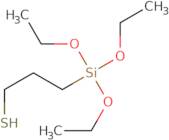(3-Mercaptopropyl)triethoxysilane
CAS : 14814-09-6
Ref. 3D-FM62907
| 25g | Arrêté | ||
| 50g | Arrêté | ||
| 100g | Arrêté | ||
| 250g | Arrêté | ||
| 500g | Arrêté |
Informations sur le produit
- 3-(Triethoxysilyl)propanethiol
- (3-Thiopropyl)triethoxysilane
- (γ-Mercaptopropyl)triethoxysilane
- 1-Propanethiol, 3-(triethoxysilyl)-
- 3-(Triethoxysilyl)-1-propanethiol
- 3-(Triethoxysilyl)Propane-1-Thiol
- 3-(Triethoxysilyl)propyl mercaptan
- 3-Mecaptopropyltriethoxysilane
- 3-Mercaptopropyltriethoxy silane
- A 1891
- Voir d'autres synonymes
- Db 580
- Dynasylan 3201
- Hd 113
- Jh-S 1891
- Kh-580
- Lmd 81
- M 1505
- Mptes
- Si 263
- Silane Coupling Agent A-1891
- Silane Coupling Agent KH-590
- Silquest A 1891
- Triethoxy(3-mercaptopropyl)silane
- VP-Si 263
- Z 6910
- gamma.-Mercaptopropyltriethoxysilane
- γ-Mercaptopropyltriethoxysilane
3-Mercaptopropyl)triethoxysilane is a silicon-based compound that has been shown to inhibit the growth of bacteria. It binds to the surface of bacterial cells and disrupts the cytoplasmic membrane. 3-Mercaptopropyl)triethoxysilane is also used in the production of polymers, as an additive in food, and as a corrosion inhibitor. In vitro studies have shown that 3-mercaptopropyl)triethoxysilane inhibits the growth of methicillin-resistant Staphylococcus aureus (MRSA). This effect may be due to its ability to bind to human serum albumin, which is required for MRSA cell wall synthesis. 3-Mercaptopropyl)triethoxysilane has also been shown to inhibit the growth of other bacteria such as Mycobacterium tuberculosis and Mycobacterium avium complex through a reaction mechanism involving sodium citrate





